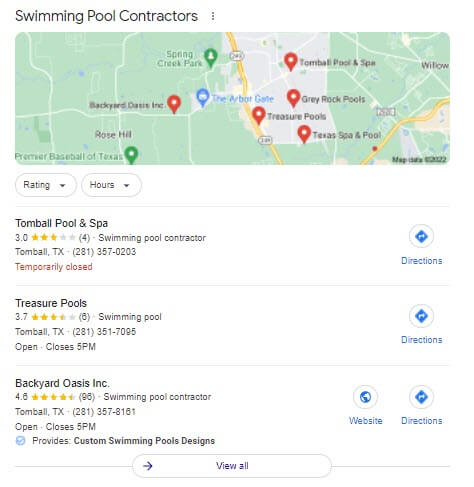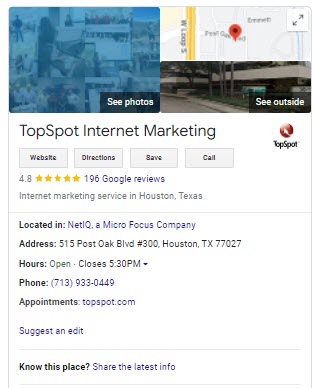April 08 2022
Local SEO: An Overview
More online attention brings more customers which brings more in more sales. Whether you have a national presence or a local brick-and-mortar storefront, local SEO can be an important part of making sure your website is found online. Local Search Engine Optimization, or Local SEO, is the focus on building a presence in local search engine results with specialized content, on-page optimizations, and link building. Optimizing your site for local search can help increase traffic to your site and could bring more potential customers.
How Local SEO Works
According to Moz, 78% of those polled think Google is the “one-stop-shop” for local searches. This is why local SEO is about more than just making sure your website has up-to-date contact information. When it comes to local optimization, two of the main pillars of local search are proximity and relevance.
Proximity
Proximity is one of the strongest ranking factors behind local searches. Location and convenience are good traits to show for local businesses trying to appeal to customers. The closer you are to a customers’ area the more convenient your company could be to them.
Relevance
Google states its main purpose as helping users find the most relevant results. This means understanding how your customers are searching for businesses like yours.
Run a technical and keyword audit of your website to make sure your website is running at its prime. This includes having a domain name that is relevant to a customer’s search language to help your website shows up in search engine results. For example, if you run a beauty salon then you would want to include keywords such as “beauty”, “hair”, or “salon” in your domain so it draws in more customers by matching what they are needing.
Every location of a business should have its own unique landing page that mirrors the page’s content and should contain popular keywords. Including city names in URLs help your business’ relevancy by helping the customer find the best location suited for their needs.
Every business website should include all the basic information to know about your company so it can help the customer find what they are looking for on your site. Here are some pages that should exist on your company’s webpage:
- Contact us page (with updated name, address, and phone number)
- An About Us page
- Reviews and testimonials
- Location landing pages (relevant for multiple and single-location businesses)
- An individual page for every major service or product offered (see our B-SMART Checklist for ideas around what pages to consider)
- Sitemap
Fresh content and updates
Make sure business listings, such as Google My Business and Bing Places, are being displayed correctly and managed as assets. Online business listings require content management upkeep: all listings should be accurate, free of any typos, and consistent across all platforms so human searchers can find and interact with the business and search engines can discover, evaluate, and rank the business. This also helps prevent bad information from being circulated.
Search for your own company on Google and see if your business location pops up as a Google My Business box. Look to the right of the “Suggest an edit” link, and if you don’t see a second link called “Own this business?” or similar, then your Google listing is likely verified. This puts you in Google’s map pack so customers can start finding your location due to the proximity of what they’re searching for.
Customer guidance
Title tags are an influential SEO element because it reflects the topic of each page and they influence people to click through to links, so you want to make sure there is a title tag on every page of the website. Title tags can help direct people back into your site in case they come across an error page or if you want them to take an action on your site by directing them to a particular page on your website.
Building a reliable sitemap will also help build local SEO on your website because it will list all the pages that you would like a search engine company to index. Doing this will help your website show up in local search results more often by being more prominent on the results pages.
Pro Tip: For the sitemap to do its job here, the location must be in the URL; that’s what Google first sees in the sitemap before it goes into the page.
What does this mean for you?
Taking these steps will help your business location(s) stand out in search results and reach more potential customers:
- understanding how your customers search
- creating a sitemap with location factored into the URLs
- having relevant content on your pages, including H1s, title tags, etc.
- updating your content to be consistent and correct
Keywords and correct information are vital to making sure your business stands out from the crowd and draws people in more. Once they’re there, a well-designed website can keep them engaged and wanting more information or service from your company. This will potentially bolster traffic at your business’s physical location and impact your sales.
Tags: local SEO, SEO



